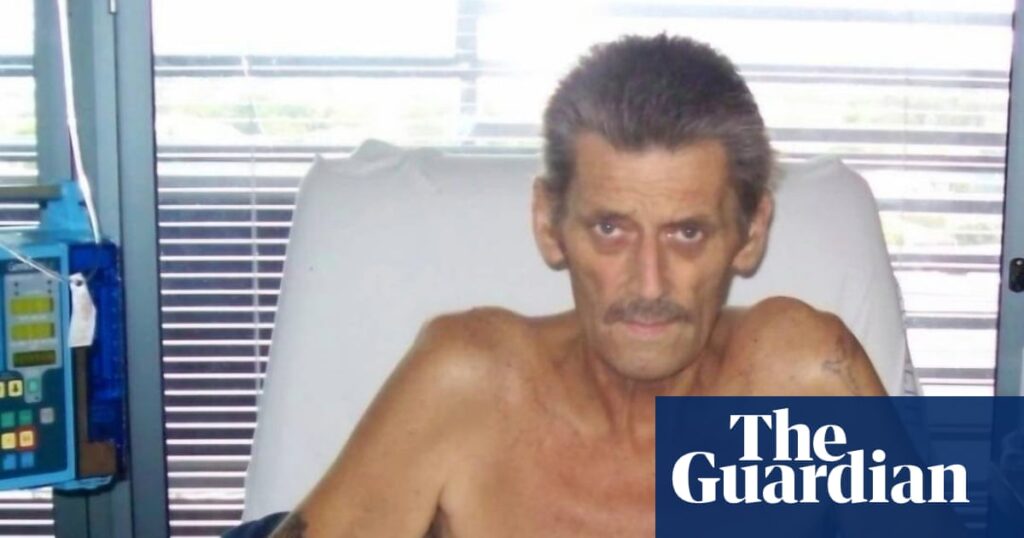In 1989 David Clune was a young dad with four children when he was diagnosed with hepatitis B and C. Being told he wouldn’t get to see them grow up “was like a spear went through my heart”, he remembers.
Clune is not sure how he contracted the virus. However, entering state care in New Zealand at the age of 10, he experienced abuse and neglect as he was cycled through eight different homes, three youth detention centres, one adult remand centre and a psychiatric hospital, and was exposed to shared needles for tattooing and drugs.
Clune quit drugs when he was 17 after meeting his long-term partner Grace and focused on their young family and working in a farming community.
But life in the community became untenable after the stigma of Clune’s diagnosis came at the same time as the Aids epidemic. “They didn’t have the understanding as they do now. It was that horrific that the children that used to play with my children in the community were no longer allowed to.”
Clune progressively became sicker. “I was a dying young dad – my organs were all failing, my kidney, my liver, my heart was under stress, everything. I was in really bad shape.”
Sign up: AU Breaking News email
In 1992, in the face of stigma, Clune’s family emigrated to Brisbane with only $180. When he got to Australia his doctor referred him to the hepatology unit at Princess Alexandria hospital.
“Those guys changed my life,” he says. “They knew what I’d been through and they built my trust. And when they built my trust, they built my health.”
Clune is among the 300,000 people in Australia who live with hepatitis B and hepatitis C – viruses that affect the liver and which, without treatment, can lead to liver disease and liver cancer.
For Clune and others, life has become significantly better now there is a cure for hepatitis C and treatment for hepatitis B, but a new report shows many people aren’t receiving this care because they don’t realise they are at risk or are disconnected from care.
Released by Hepatitis Australia on Monday, it shows how hepatitis of all types is distributed among a typical 100 people affected.
It concludes that 69 of those 100 people are living with hepatitis B, which is overwhelmingly the most prevalent blood-borne virus in Australia.
The remaining 24 are living with hepatitis C, four are living with both hepatitis B and D, and three are living with hepatitis B and hepatitis C.
However, only one in three people living with hepatitis B know they have it, and more than half are not receiving the care they need to appropriately monitor their liver health and viral load, and determine if and when antiviral treatment should commence, the report found.
Most people (70 out of 100) with hepatitis B were born overseas, according to the report, titled “If hepatitis was 100 people”.
after newsletter promotion
“While people born in Australia since the year 2000 (when hepatitis B vaccinations began being routinely offered) are protected, people born before then, or those born overseas could be living with the virus and not know it because the symptoms often aren’t obvious until the liver is severely damaged,” Lucy Clynes, the chief executive of Hepatitis Australia, said.
The number of people living with hepatitis C has more than halved since 2016 when unrestricted access to direct-acting antiviral cures became available, but the uptake of the cure has declined “significantly” since then, the report found.
Stigma and discrimination associated with injecting drug use remains a barrier for all people living with hepatitis C in accessing treatment, the report stated.
Out of 100 people with hepatitis C, 84 no longer inject drugs or contracted the disease in other ways. Clynes said the work to ensure people who inject drugs are receiving the cure has been effective, “which is why we’re seeing a change in the population”.
The people who contracted hepatitis C in other ways – which could be unsafe tattooing, receiving a blood transfusion before 1990 (when screening was introduced) or getting a medical or dental procedure in a country with poor blood safety regulations, are less likely to be interacting with medical services, Clynes said.
The report says population-wide testing should be carried out urgently, along with targeted education, and culturally safe care pathways – otherwise Australia will not meet its commitment to eliminate viral hepatitis by 2030, in line with global WHO targets.


